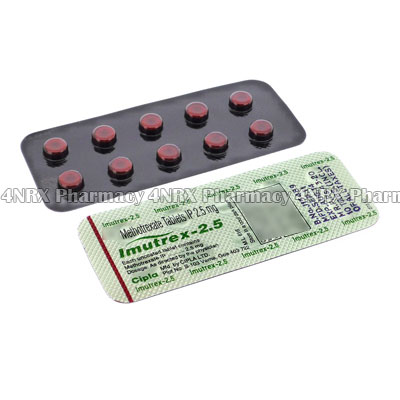 |
Home  Cancer Cancer  Imutrex (Methotrexate) Imutrex (Methotrexate) |
|
|||||||||
|
|
Imutrex (Methotrexate)
What is Imutrex (Methotrexate) used for? Imutrex (Methotrexate) is an oral cancer medication prescribed to treat a wide variety of cancers. These may include skin cancer, bone marrow cancer, or breast cancer. The medication operates by slowing the growth of tumors to prevent their spread allowing removal through other procedures. Your physician may also prescribe it to treat other conditions that are not listed here. How should I use Imutrex (Methotrexate)? Always follow your physician's instructions for using Imutrex (Methotrexate) to get the best results. It is normally taken once each day at a dosage of one tablet, but your particular directions may differ depending on your condition. Swallow these tablets with a full glass of water on an empty stomach to reduce nausea. Never make any unscheduled changes to these directions to prevent causing unexpected problems. What are the side effects of Imutrex (Methotrexate)? Some patients have reported experiencing side effects while using Imutrex (Methotrexate) such as:
It is important to inform your physician if any of these symptoms become intense or if you experience halted urination, flu symptoms, coughing, diarrhea, or discolored urine or stools. These conditions may indicate serious health problems and require immediate medical care. Please Note Do not use Imutrex (Methotrexate) if you have hepatitis, anemia, bleeding disorders, or a widespread infection. Also inform your physician if you have ulcerative colitis, peptic ulcers, or decreased liver or kidney function. These conditions may require adjustments ot your regimen to prevent potential problems from occurring. Strictly follow all instructions provided to you by your physician or pharmacist while using Imutrex (Methotrexate). Optimum and safe dosage can differ based on the patient and the condition being treated. As this medication may be unsafe for certain patients, it is essential you always inform your physician if you are pregnant or breastfeeding, as well as if you have any allergies, other illnesses, or ongoing health conditions, and if you are taking any other form of medication, supplements, or herbal products. Immediately seek emergency medical care if you have an allergic or hypersensitive reaction. Common signs of a reaction include hives, swelling, skin rashes, chest pains, as well as trouble breathing or swallowing. 

|
||||||||||||||||||||||